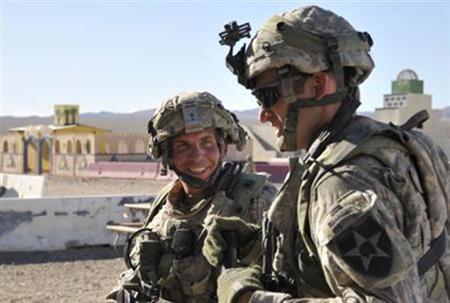(Reuters) – A decorated U.S. soldier accused of killing 16 Afghan villagers in two forays from his remote military camp was ordered to face a court martial before a military panel that could impose the death penalty if he is found guilty, the military said on Wednesday.

No date has been set for the capital trial of Army Staff Sergeant Robert Bales, which is scheduled to take place at Joint Base Lewis-McChord in Washington State, military officials said in a statement.
U.S. military prosecutors want the death penalty for Bales, a veteran of four combat tours in Iraq and Afghanistan who is accused of gunning down the villagers – mostly women and children – over a five-hour period in March in Afghanistan’s Kandahar province.
The shootings, among the deadliest involving civilians that the military has blamed on an individual U.S. soldier since the Vietnam War, have further damaged already strained U.S.-Afghan relations.
On the night of the slayings, Bales drank with two fellow soldiers then left his base and went to a village where he committed the first killings, prosecutors said. He then returned to the camp and had a brief exchange with another soldier before leaving for a second village and more killing, they said.
The government believes Bales was solely responsible for the deaths, and survivors have testified they saw only one U.S. soldier. But several indirect accounts have suggested more than one soldier may have been involved.
Bales’ lawyers have not set out an alternative theory to the prosecution’s allegations, but have pointed out inconsistencies in pretrial testimony and highlighted incidents before the shooting where Bales lost his temper easily.
Those incidents could possibly set up an argument that Bales was suffering from post-traumatic stress disorder.
DEATH PENALTY
A military jury must come to a unanimous decision in deciding guilt as well as whether to impose the death penalty, and they must find at least one aggravating factor that significantly outweighs any mitigating circumstances.
The military justice system also requires the president to approve the execution of a service member. The last U.S. military execution, for rape, occurred in 1961.
Emma Scanlan, a civilian defense attorney for Bales, said on Wednesday her client suffers from an unspecified mental disorder and criticized the decision to refer his case to a capital court martial.
“It’s ignoring the Army’s own responsibility for an abysmal mental health system,” Scanlan said.
She added that, before the shooting, members of a U.S. military special forces team at the base where Bales was assigned had given him steroids and alcohol.
The charges against Bales include 16 counts of premeditated murder, six counts of attempted murder and seven of assault, among other charges, the military said.
During a nine-day pretrial hearing in November, witnesses testified that Bales had been upset by the lack of action over an attack on a patrol several days before the shootings in which the lower part of a soldier’s leg was blown off by a bomb.
Prosecutors presented physical evidence to link Bales to the crime scene, with a forensic investigator saying a sample of blood on his clothes matched a swab taken in one of the compounds where the shootings occurred.
Bales, a father of two, is being held at Joint Base Lewis-McChord. His wife, Kari, said in a statement that her husband, who grew up in Ohio and most recently lived in Lake Tapps, Washington, was entitled to a fair trial.
“I have said from the start that I want my Bob to have a fair trial,” she said. “I no longer know if a fair trial for Bob is possible, but it very much is my hope and I will have faith.”
(Reporting by Laura L. Myers; Writing by Alex Dobuzinskis; Editing by Cynthia Johnston, Gary Hill and Todd Eastham)





